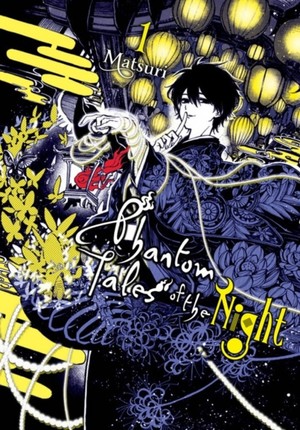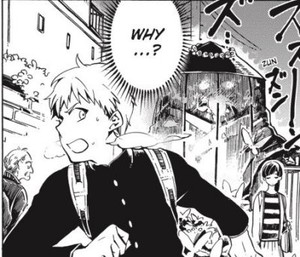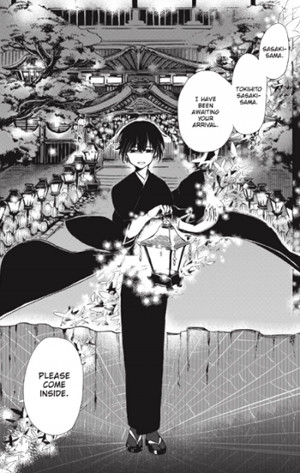The Fall 2019 Manga Guide
Phantom Tales of the Night
What's It About?
 Secrets lie deep in the heart of every person. Things we'd rather the people around us didn't know. Be it from shame or fear, we often hide the darkest, most tender parts of ourselves away, where we hope no one will ever chance upon them. In the world of spirits, there exists someone whose stock and currency is secrets. He is an innkeeper at the Murakumo Inn, a home away from home which wayward souls use for refuge and rest. Be careful, however. The price is your secrets, and the innkeeper will do anything to obtain them. There's no telling what he might do with them. Or if you'll even have a life in which to hide your secrets, afterwards.
Secrets lie deep in the heart of every person. Things we'd rather the people around us didn't know. Be it from shame or fear, we often hide the darkest, most tender parts of ourselves away, where we hope no one will ever chance upon them. In the world of spirits, there exists someone whose stock and currency is secrets. He is an innkeeper at the Murakumo Inn, a home away from home which wayward souls use for refuge and rest. Be careful, however. The price is your secrets, and the innkeeper will do anything to obtain them. There's no telling what he might do with them. Or if you'll even have a life in which to hide your secrets, afterwards.Phantom Tales of the Night is an original manga series by Matsuri. It is published by Yen Press, retailing for $15.00 physically and $6.99 digitally.
Is It Worth Reading?

Rebecca Silverman
Rating:
Phantom Tales of the Night feels like what happens when you cross xxxHOLiC with Hell Girl. That's not necessarily a bad thing, although this volume doesn't quite capture the essence of what made those two series so good, and it certainly gives creator Matsuri a lot of supernatural wiggle room while still keeping things relatively familiar for fans of the “be careful what you wish for” genre. Mostly this first volume suffers from being just a little too caught up in its own sense of mystery, leading it to leave things unexplained that might really have been better spelled out while still somehow drawing you in to a world it's impossible to fully understand.
If that's your dark fantasy catnip, this is hard to put down. Matsuri manages to keep things intriguing rather that frustrating (although there are definitely elements of the latter), and one of their best moves was to return to the character from the first chapter in the last. Sasaki-kun, the middle-or-high school age boy who begins the series unaware that he's dead, is given a sort-of chance to keep “living” by the mysterious proprietor of the otherworldly Murakumo Inn, who solidifies his ghostly form by giving him back bones and just enough flesh to appear human if he keeps his clothes on. Ostensibly the proprietor does this because Sasaki-kun lacks the price the proprietor demands for his help – a secret. The innkeeper maintains that by making Sasaki-kun a sort of living dead, he has given him a secret should he ever need one – the secret being, of course, that he's dead. Sasaki-kun himself doesn't necessarily see it that way, because most of his perimortem life is still a secret to himself; in chapter one he remarks that he doesn't remember what his parents look like or who they are. Could he trade his new secret to the innkeeper for answers? That possibility is what makes him a good recurring character, because it's not one he's realized for himself yet and makes him vulnerable to being preyed upon by those with a grudge against the proprietor, such as happens in the fourth chapter.
The art for the series is beautifully complex, denser than xxxHOLiC-era Clamp, but still somewhat similar. There are lots of swirls of darkness, layered images, and small, almost hidden details that help give things an otherworldly air. Bodies aren't always drawn proportionately, but Matsuri does a good job with physical horror – the images of Sasaki-kun realizing he's dead are both gross and chilling, and if you have a problem with spiders, there's one character who is very likely to set you off. (He may still gross you out if you prefer your human men without spider legs coming out of their backs.) Most striking is the genderless way the proprietor is drawn – they go from wearing a woman's furisode in chapter one to a more masculine kimono later and don't appear to have any fixed gender. From the cultural note in the back, I assume Yen Press went with “he/his” pronouns because the masculine word for “proprietor” was used in Japanese, but it honestly doesn't seem to fit the character.
This first volume is imperfect, but it's also very intriguing. I'm definitely giving it a second book before making a more definite call.

Faye Hopper
Rating:
Phantom Tales of the Night is a story without heroes. In the first chapter, an Innkeeper gives shelter to a young boy pursued by evil phantoms, in what seems at first a benevolent gesture. It turns out to be anything but, however, as the Innkeeper cruelly reveals to the young boy that he has never been human at all, that he had never had any friends and his whole life he has been an immaterial spirit, and, stealing what he calls to the boy's ‘secret’, casts him off to a life as a skeleton, never able to reveal his true nature to the people around him lest he be ostracized. When someone does finally come to oppose the Innkeeper, he is framed as oafish, manipulative, and far too weak to ever hope to defeat the Innkeeper's sheer demonic power. But this darkness, this lack of people to root for, does not mean the book is lacking in empathy. In the first story, you feel the anguish and pain as the young boy comes to realize his life is nothing but a lie, reflected in him looking down to see chewed-away flesh and bone. The Innkeeper chastises his servant, Butterfly, for absorbing the soul of a human without understanding that her desire to replace her better-liked twin was just her crying out to be seen, to be appreciated. It's this psychological insight that keeps Phantom Tales from slipping over into outright misanthropy and misery, and see the painful tragedy behind even its darkest moments.
Phantom Tales of the Night, with all its macabre flourishes, heavy shadows and dark, horrific ends for so many of its characters, is perfect Halloween reading. It's a not a horror manga per-se, but it has an eerie quality about it that can't be ignored, with images and tableaus that linger in your mind long after you put the book down. I'm not quite sold on its worldview, given the sheer depth of suffering in its pages and the moral antipathy displayed by almost all of its cast, but it is striking, uncanny, and even beautiful, if you're like me and could wallow in its sharp lines and thick, black inks for hours. As someone who has always liked things a little twisted, a little demented, it scratched my itches and then some in aesthetic alone, and when topped off with its smart storytelling and emotional understanding, it makes for a gripping, Twilight Zone-style anthology about human nature and the things we tuck away deep inside ourselves. I am hooked. I'm curious to see what other secrets lie in the hidden, protected caverns of the human soul, and what secrets the Innkeeper has lurking inside him, too.
discuss this in the forum (44 posts) |
back to The Fall 2019 Manga Guide
Feature homepage / archives